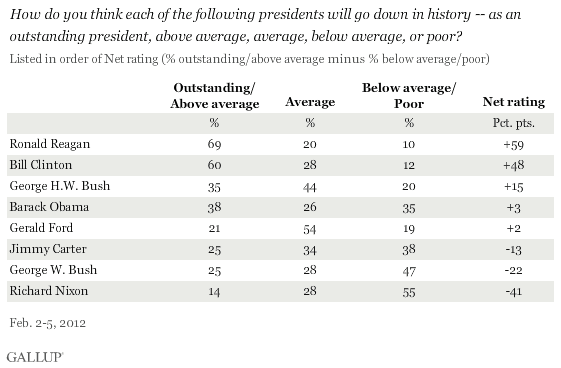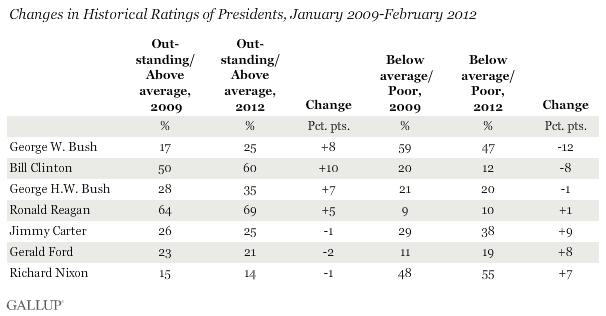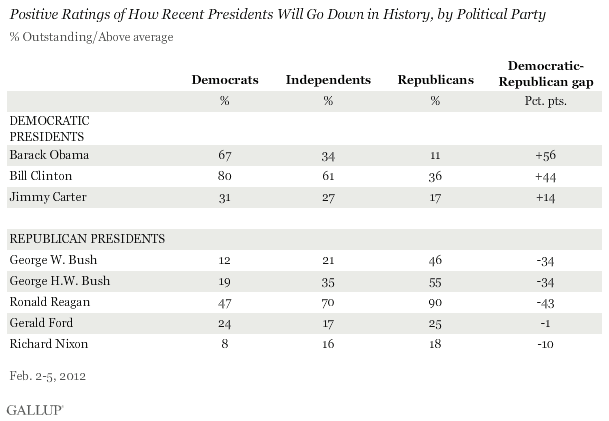PRINCETON, NJ -- Americans believe history will judge Ronald Reagan and Bill Clinton as the best among recent U.S. presidents, with at least 6 in 10 saying each will go down in history as an above-average or outstanding president. Only about 1 in 10 say each will be remembered as below average or poor. Three years into Barack Obama's presidency, Americans are divided in their views of how he will be regarded, with 38% guessing he will be remembered as above average or outstanding and 35% as below average or poor.

Gallup periodically asks Americans to assess how they believe presidents will go down in history. The current results are based on a Feb. 2-5 poll and include presidents Richard Nixon through Obama, with this being the initial measurement of Obama on this question. Aside from Clinton and Reagan, only George H.W. Bush gets significantly more positive than negative ratings. Nixon and George W. Bush are rated as the worst, with roughly half of Americans believing each will be judged negatively.
Compared with Gallup's previous update -- conducted in January 2009, just before Bush's presidency ended and Obama's began -- ratings of several presidents are up. This includes George W. Bush, whom Americans judged even more poorly than Nixon in the prior update.
Specifically, positive ratings of Bush increased from 17% to 25% since 2009, while negative ratings of him declined from 59% to 47% in the three years since he left office. Positive ratings of Clinton, Reagan, and the elder Bush are also higher than in January 2009. There has been no meaningful change in positive ratings of Jimmy Carter, Gerald Ford, and Nixon. However, these three have seen an increase in negative ratings compared with three years ago.

Americans now rate Clinton and Reagan more positively on this question than at any time since Gallup first asked about them, in 1985 for Reagan and in 1997 for Clinton.
Partisans Expect History to Judge Their Own More Favorably
Democrats tend to believe history will judge Democratic presidents more favorably than Republicans do, and Republicans believe Republican presidents will be regarded more favorably than Democrats do.

But partisans do not universally rate all of their party's presidents better than all of the other party's presidents. For example, 36% of Republicans believe Clinton's presidency will be viewed as outstanding or above average, a higher percentage of GOP supporters than believes that about Republican presidents Ford (25%) and Nixon (18%). Meanwhile, Democrats are more likely to believe Reagan will get favorable historical judgments (47%) than that Carter will (31%).
With a 46% outstanding/above-average rating from Republicans, George W. Bush joins Carter, Ford, and Nixon as presidents getting less-than-majority positive ratings from their own party's supporters.
The table shows that party differences in presidents' ratings are more pronounced for presidents dating back to Reagan than they are for Carter, Ford, and Nixon. This could be an extension of the greater polarization in approval ratings of presidents since the Reagan administration. It also could reflect the fact that respondents, particularly those under age 40, are more familiar with the administrations of the recent presidents and have more information upon which to evaluate those presidents.
Implications
Americans generally regard Reagan and Clinton as the best presidents in recent memory, back through the Nixon administration. Their positive ratings could be tied to the fact that both were in office during strong economic times. Of the remaining presidents, only George H.W. Bush is rated much more positively than negatively, perhaps because of his strong record on foreign policy.
Americans still rate George W. Bush among the worst presidents, though their views have become more positive in the three years since he left office. Views of Bush have improved about equally among Democrats, Republicans, and independents, suggesting that the passage of time may be helping Americans see him in a slightly less negative light.
Survey Methods
Results for this Gallup poll are based on telephone interviews conducted Feb. 2-5, 2012, with a random sample of 1,029 adults, aged 18 and older, living in all 50 U.S. states and the District of Columbia.
For results based on the total sample of national adults, one can say with 95% confidence that the maximum margin of sampling error is ±4 percentage points.
Interviews are conducted with respondents on landline telephones and cellular phones, with interviews conducted in Spanish for respondents who are primarily Spanish-speaking. Each sample includes a minimum quota of 400 cell phone respondents and 600 landline respondents per 1,000 national adults, with additional minimum quotas among landline respondents by region. Landline telephone numbers are chosen at random among listed telephone numbers. Cell phone numbers are selected using random-digit-dial methods. Landline respondents are chosen at random within each household on the basis of which member had the most recent birthday.
Samples are weighted by gender, age, race, Hispanic ethnicity, education, region, adults in the household, and phone status (cell phone only/landline only/both, cell phone mostly, and having an unlisted landline number). Demographic weighting targets are based on the March 2011 Current Population Survey figures for the aged 18 and older non-institutionalized population living in U.S. telephone households. All reported margins of sampling error include the computed design effects for weighting and sample design.
In addition to sampling error, question wording and practical difficulties in conducting surveys can introduce error or bias into the findings of public opinion polls.
View methodology, full question results, and trend data.
For more details on Gallup's polling methodology, visit www.gallup.com.
